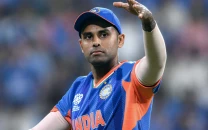Dual nationality and cricket
The issue calls for greater sensitivity and right mindedness to ensure long lasting solution.

Sports receded to a state of chaos and confusion in 21st century. Immigration, both internal and international, brought new issues to the forefront; dual nationality was one of them. The United Nations estimates that 232 million people (3.2 per cent of the world’s population) are migrants, up from 154 million in 1990. The children of these migrants often have dual or multiple citizenship and which country they choose to represent can become a matter of incredibly complex negotiations. Ali Zafar writes in his column in these pages: “With the changing relationships between nation states, emergence of democracies, development of international trade and commerce, and decreasing probability of wars, more than half of the world’s states now tolerate some form of dual nationality.” Dual nationality literally means holding two citizenships. A number of players were torn between the choices to play for the country they grew up in, as against their country of descent. The ambiguity around the issue prompted many countries to legislate laws on the matter. Despite clarity in rules, players face hostility on both the side.
Citizenship is the relationship between the individual and the state, and as such it includes the rights and duties stemming from an individual’s membership in the polity. Yet, these rights and duties are preconditioned by the citizenship status, which is referred to as nationality in international law. The clearest link between the status of citizenship and sport is the requirement that sportspeople need to possess the nationality of the state in order to represent that state in international competitions. Some sportspeople possess the nationality of the state by virtue of the fact that they were born into it, or that they have blood or other ties with that state.
Azhar Mahmood, a Pakistani cricketer who is now a British citizen found himself on crossroads when he was extensively criticised for using his British passport for getting a place in the Indian Premier League. When he was dropped from the national squad in Pakistan, Mahmood went back to UK and now plays for England. Among those Pakistani cricket holding dual citizenship Saadat Gul Khan came to Ireland in 1998 and plays for Rush Cricket Club. Ehtesham Ahmed, a Pakistani cricketer who has lived in Ireland for 11 years, says he has no split loyalties. In a response to an Irish newspaper over which team he would support when Pakistan played in Ireland in 2013, he said: “It’s my dream come true to see the country of my birth playing against my adopted country. I can’t wait to see the Ireland boys giving the Pakistanis a hard time in Castle Avenue.”
It was in 1951 that the legislation on dual nationality of Pakistanis was incorporated in the Constitution of Pakistan as the Pakistan Citizenship Act 1951. Since then, many amendments have been made to address the needs of the time and to deal with the change in the circumstances of the country. However, it is peculiar that Pakistani citizens can hold dual nationality, unlike many other countries which allow their players to freely play aboard. As of today, as per the Constitution of Pakistan; Pakistanis can also hold citizenship of 16 countries namely the United Kingdom, United States, Italy, France, Belgium, Iceland, Australia, New Zealand, Sweden, Ireland, Netherlands, Switzerland, Canada, Egypt, Jordan and Syria.
Nationalism is an important aspect of the game and therefore the case of dual citizenship persists at the helm of affairs for both players and viewers. It has long been controversial where the allegiance of dual nationality citizens lie and whether they can be expected to be loyal to either of the countries. On June 14, 2009 when England played India at Lord’s in the International Cricket Council (ICC) World Twenty20 Cup, despite England being victorious, the contest was marred by the events earlier that day. Former Captain Paul Collingwood said that the team was jeered and booed by hundreds of British Asians who had come to support the Indian team after the match. The incident sparked a debate over the sporting allegiance of British Asian, as majority of the perpetrators were British Asians. The question of British citizenship and loyalty in sports resurfaced in the UK, as with many other countries. Similar doubts have also been raised about sportsmen who hold dual nationality.
During the spring and summer of 2001, a number of towns and cities in northern England witnessed tensions between British Asians and white communities. This was a direct result of the US initiated global war on terror as a response to the terrorist attacks on the US on September 11, 2001. Shortly thereafter, many British Asians were reported to have experienced a backlash, often a violent one. The situation worsened after the 2005 terrorist attacks on London. A paper said: “A direct consequence of these episodes is that the citizenship, national affiliations and identities of British Asians, especially Muslims, have become subject to rigorous political and public debate.”
Nationality and citizenship are often reduced to the place of birth. However many believe that “heritage, birthplace, naturalisation, ethno-cultural considerations, and a multitude of other factors are all flushing currents part of the vaguely chaotic maelstrom that is national identity” and the issues should not be simplified. English team has often been pointed out as the cricket team with most players from abroad. Long after the dissolution of the British Empire, England continues to draw cricketing assets from its former colonies and beyond. Players like Kevin Pietersen and Jonathan Trott, born in South Africa albeit, form an integral part of wider English diaspora.
A Sports Life survey of Britain’s Olympic governing bodies revealed in 2012 that of the estimated 550 British athletes who competed for medals in London Olympics, around 50 were born abroad, having joined the Great Britain ranks after London was selected as host city in 2005. The influx of foreign-born athletes in Britain has provoked acute criticism. Often termed as 'Plastic Brits’, foreign players have been disparaged for their little concern for the country. As the Mirror Journalist, Simon Hart said, “They are little more than Olympic tourists who will take the places of home-grown competitors, then return to their homeland once the Olympic flame has been extinguished.”
English County Cricket has also been long overflowing with foreign players. The judgments of the European Court of Justice in the Bosman and Kolpak cases ensured that foreign players can play first class cricket unrestricted, as a result in the regulations adopted by the England and Wales Cricket Board in the light of those judgment. It appears that Britain’s colonial empire looms over English cricket. However, “The current crop of players is both a logical consequence of the colonial diaspora and a reflection of the shifting, malleable concept of nationality”. It is argued that society is changing and so is the perception of what it means to belong to a nation or a country. “Diaspora is becoming more and more important given the increased movement of large swathes of the human population, and England’s cricketers illustrate this in an overt, evident way that not much else can.” However the focus tends to be on white-voices and ethnic voices are usually ignored. According to one research paper: “The relationship between British Asians and sport generally, remains a relatively under-researched and misunderstood area of sociological inquiry. Dominant histories of the sport in England have centralized white voices.”
Questions are also raised in the former colonies from where a large number of people migrated to different countries. The players from such nations find it very difficult in both the lands. Whereas it’s easy to play in their host country, there is pressure from kith and kin to play for their native land. The chaos and confusion can prove to be detrimental for their careers. They are expected to justify their stand for whichever country they choose to play for. When Tanmay Mishra was picked in Indian Premier League, several eyebrows were raised. Mishra, who a player of Indian origin, has played for Kenya regularly. Such was the state of controversy that Mishra had to defend his stand. He explained: “I hold an Indian passport, so I'm eligible to play as an Indian. On the other hand, since I have played my junior cricket for Kenya, I can play for their national team as well.” “Not many know I play first division cricket in Mumbai, for a club called Payyade SC,” Mishra added. It’s hard to say whether Mishra was let go after clarification, however it did reveal an underlying scepticism for the player of dual nationality. The matter often takes an ugly turn as happened in case of Moeen Ali. Ali, a Warwickshire cricketer of Pakistani descent was victim of racial abuse when he was called up for the English team. Ali’s distinctive beard, a mark of a devout Muslim made him a subject of abuse on the social networking site.
As the world becomes increasingly globalised, things are deemed to complicate. In countries such as Australia, there are people from more 150 nationalities and every third person either was born outside Australia. A significant number of people holding dual nationality are Pakistani Australians. There is usually no fuss about it. The changes were implemented not very long ago in when the White Australia Policy was abolished. Australia won the highest reputation and respect in the world after the demolition of the White Australia Policy. Whereas countries such as South Korea and Russia have strict immigration policies that make it difficult for outsiders to obtain citizenship or immigrants to assimilate in the countries. It has resulted in an isolationist approach where countries could not harness their immigrant populations. Spain, Portugal, Germany and Croatia, have all focused on their own youth empowerment and use dual national players.
India too has a complex set of legislations on the status of dual-nationalities players. Since the Indian national team does not recognise the players of dual nationalities, they do not have a single player who plays outside of India. For a country with over a billion nationals, it can be waste of resources. Many well know local players such as Michael Chopra, Neil Taylor, Rhys Williams, Vikash Dhorassoo and Harmeet Singh are all ineligible for the national side because they possess two passports.
France’s Front National leader Marine Le Pen called for the end of dual nationality following riots in several French cities after Algeria’s last World Cup match in June. Le Pen said: “the violence proved total failure of immigration policies in our country and the refusal expressed by a number of binational citizens to assimilate.” Echoing Norman Tebbit’s 1990 “cricket test” comments, in which he claimed that immigrants from South Asia, Africa, and the Caribbean would not be truly assimilated into the UK until they supported their new country rather than their respective homelands, Le Pen argued that people holding dual nationality should support France in international tournaments. “You should pick: are you Algerian or French, Moroccan or French? You cannot be both,” she added.
The future is likely to see the number of dual national players rise. Some countries may try to take advantage of the system and so will the many citizens. According to a Pakistani journalist, “Escaping a life lived in the shadows of unrelenting violence, especially in light of the state’s inability to provide basic necessities, would appear to be a rational decision. Instead, most Pakistanis would balk at openly admitting that they would like to move abroad, citing their patriotism as a reason to stay in the country regardless of its problems.”
“In the absence of making any meaningful difference in society to solve Pakistan’s problems, we chose to overcome the insecurity of our hollow patriotism by questioning the patriotism of a sub-sect of Pakistanis with ‘questionable’ street crowd, i.e., dual nationals”, he adds. The issue being very complicated and sensitive, at the same time calls for greater concern and policies in the field. It affects a large section of population which feels disenfranchised as a result of scepticism from both the countries. The issue also calls for greater sensitivity and right mindedness to ensure long lasting solution.
Published in The Express Tribune, August 25th, 2014.
Like Opinion & Editorial on Facebook, follow @ETOpEd on Twitter to receive all updates on all our daily pieces.



















COMMENTS
Comments are moderated and generally will be posted if they are on-topic and not abusive.
For more information, please see our Comments FAQ